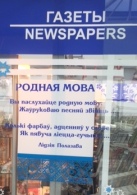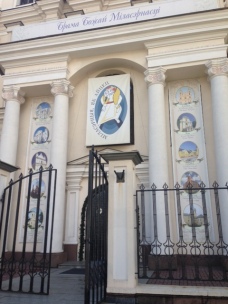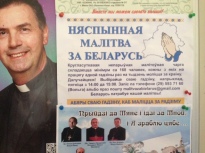
The writing on the shop display at the Minsk airport, “The native tongue”
So here I am in Belarus, a country with two official languages – Belarusian and Russian. The latter one remains, however, lingua franca. It is the language of almost all spheres of public life, including media, politics, and education. Belarusian remains largely marginalised.
I have written more about it here.
Yet, this linguistic complexity is interesting from my research point of view.
Why certain groups of people decide to express themselves in Belarusian, not in Russian? Why in Russian only? Why solely in Belarusian? Should I pay attention to those choices or are they rather random? Do they necessary carry a political meaning?

The entrance to the Church of Saint Virgin Mary, Minsk. The caption says: The Gate of the God’s Mercy (in Belarusian)
What I noticed the most Belarusian-language friendly place are … churches in Belarus. Particularly, the Catholic Church (yes, in some places there is still a mixed language policy, with Polish and Belarusian languages) and some Protestant churches. However, it is not a principle. Some, indeed, keep it as a standard and actually sort of “impose” it on their members, while others follow the language of the majority of their members, often Russian.
The vast majority of my Protestant respondents preferred talking to me in Belarusian over Russian. Knowing the language clearly helped me to reach people for my research and build necessary rapport. Paradoxically, in a place like Minsk where always feel that Belarusian language remains somewhat marginalised, the communities that I visited primarily were speaking it.

“Continuous prayer for Belarus” in the Church of Saint Virgin Mary, Minsk.